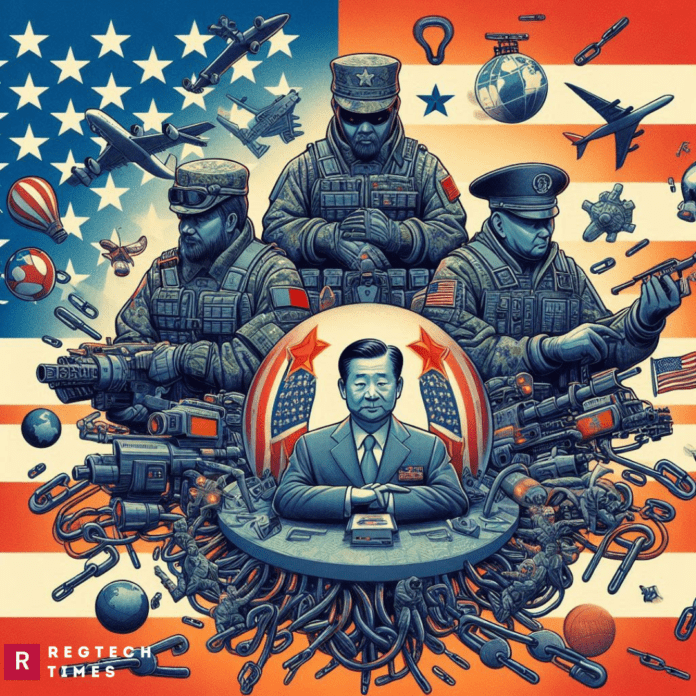The United States has recently intensified its trade restrictions by adding six companies to its Entity List, a move aimed at safeguarding national security and foreign policy interests. The decision, announced on Tuesday, targets entities connected to the training of China’s military forces using Western and NATO sources, among other violations.
Companies Added to the Entity List
Among the six companies newly added to the Entity List due to trade restrictions, two are based in China, one in South Africa, two in the United Arab Emirates, and one in the United Kingdom. These companies have been identified due to their involvement with the Test Flying Academy of South Africa, a company already on the list for training Chinese military pilots with Western and NATO methodologies.
Global Training Solutions Limited (China)
Smartech Future Limited (China)
Grace Air (Pty) Ltd (South Africa)
Livingston Aerospace Limited (United Kingdom)
The Test Flying Academy of South Africa had previously been added to the Entity List for similar activities, underscoring the US government’s commitment to using trade restrictions to prevent the transfer of sensitive military training to foreign adversaries. The latest additions reflect an ongoing effort to curb activities that are considered detrimental to US national security and foreign policy through stringent trade restrictions.
The United Arab Emirates-based companies Mega Fast Cargo and Mega Technique General Trading were included on the list for their evasive conduct. Mega Fast Cargo, in particular, was cited for shipping US-origin goods to Russia, an action that contravenes US export regulations.
Companies listed on the Entity List face stringent licensing requirements to ship US goods and technology. These licenses are typically denied by the US Commerce Department, effectively restricting the listed companies’ access to American products and technologies.
Impact and Response
The addition of these companies to the Entity List signals a robust approach by the US to enforce export controls and prevent sensitive technologies from reaching adversarial entities. This move aims to mitigate risks associated with the transfer of advanced military training and technologies that could enhance the capabilities of strategic competitors like China and Russia. By tightening these controls, the US seeks to safeguard national security and maintain its technological edge over potential adversaries.
The affected companies are likely to face significant operational disruptions, including challenges in procuring essential technologies and components from US suppliers, potential loss of business partnerships, and increased scrutiny from other countries that align with US export control policies. The lack of immediate response from these companies suggests they are assessing the full scope of these implications and formulating strategies to mitigate the adverse effects on their international trade relationships and business operations.
Unverified List Updates
In a parallel move, the Commerce Department also revised its Unverified List, adding 13 companies, including eight from China. The Unverified List includes entities for which US export control officers could not complete on-site visits to verify compliance with US regulations. Companies on this list require additional due diligence from US exporters before transactions can proceed, and may also necessitate additional licensing.
The updates to the Unverified List included the removal of eight companies: six from China, one from the UAE, and one from Russia. These removals indicate that the US government has either completed its verification processes or has otherwise resolved the issues that initially warranted the companies’ inclusion on the list, thereby adjusting its trade restrictions accordingly.
Strategic Implications
The Entity List and Unverified List are critical tools employed by the US to control the export of sensitive goods and technology through trade restrictions. By tightening these restrictions and adding companies to these lists, the US aims to prevent its advanced technologies from being used in ways that could undermine its strategic interests or enhance the capabilities of its competitors.
The recent additions reflect broader geopolitical tensions and the US’s efforts to safeguard its technological edge through strict trade restrictions. As global trade dynamics continue to evolve, the enforcement of export controls and trade restrictions remains a pivotal aspect of US national security strategy.
The United States’ recent expansion of its Entity List and updates to the Unverified List highlight its proactive stance in regulating the export of sensitive technologies. These measures are designed to protect national security interests and ensure that US-origin goods and technology do not fall into the wrong hands. The impacted companies, spanning multiple countries, now face significant operational challenges as they navigate these heightened restrictions.


